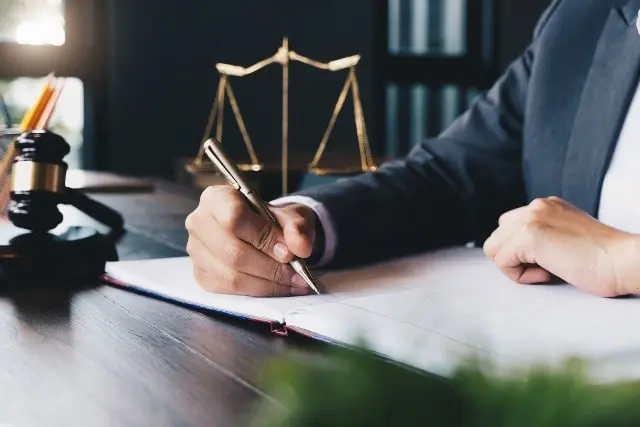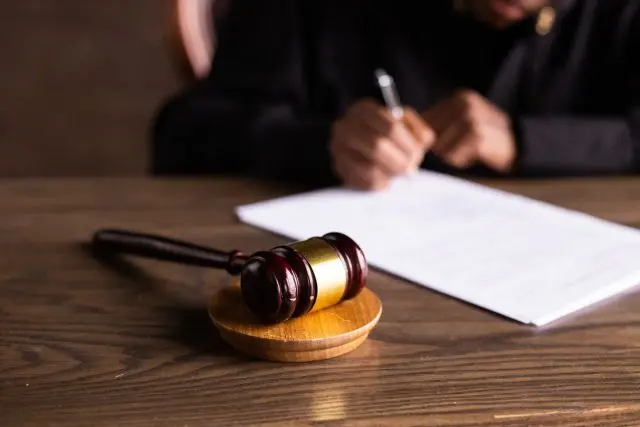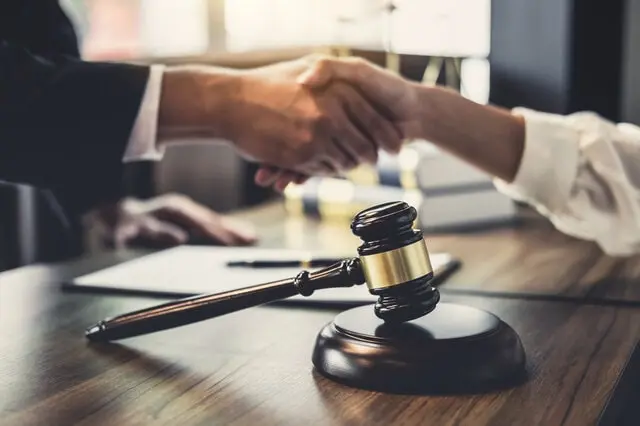Trusted Plea Bargain lawyer
Learn about the plea bargain process in Georgia and how Conoscienti and Ledbetter can help you navigate plea agreements effectively.
 Author: J. Blake Ledbetter, Partner, Conoscienti & Ledbetter
Author: J. Blake Ledbetter, Partner, Conoscienti & Ledbetter
Mr. Ledbetter specializes in civil litigation in metropolitan Atlanta, Georgia, and possesses vast experience in wrongful death lawsuits. Mr. Ledbetter was recognized as a SuperLawyers Rising Star in 2018 and 2019 in the area of Civil Litigation. Published on July 9, 2024.

Speak with experienced criminal defense lawyer today, for free.
How Does a Plea Bargain Work?
In Georgia, as in many other states, plea bargains play a critical role in resolving criminal cases. A plea bargain is an agreement where the accused pleads guilty to lesser charges or gets a reduced sentence.
Throughout Georgia, this practice allows prosecutors and defense attorneys to negotiate terms that balance justice and efficiency. The benefits are clear: fewer lengthy trials, lower costs, and the ability to focus on more severe cases.
Georgia’s approach to plea bargains encompasses unique challenges and implications. At Conoscienti & Ledbetter, we are committed to helping you navigate the criminal justice system. An experienced criminal defense attorney would help you weigh your legal options, including whether to reject or accept the prosecution’s offer.
Types of Plea Bargains
In Georgia, plea bargains come in several forms. Each type aims to streamline the legal process while balancing the interests of the defendant and the prosecution.
1. Charge Bargaining
This involves negotiating the charge itself. A defendant pleads guilty to a lesser charge than originally filed. For instance, instead of facing a felony, one might plead guilty to a misdemeanor.
2. Sentence Bargaining
Sentence bargaining focuses on the punishment. Defendants agree to plead guilty in exchange for a lighter sentence recommendation from the prosecutor. This can significantly reduce prison time or result in probation instead of incarceration.
3. Fact Bargaining
Less common but significant, fact bargaining occurs when a defendant agrees to stipulate certain facts in exchange for the prosecutor omitting other damaging details. This can have a substantial impact during sentencing.
In Georgia, plea deals require judicial approval. Judges ensure that agreements are fair and consistent with legal standards. Consequently, while plea deals can expedite the legal process, they also require careful consideration and professional legal advice from experienced criminal defense attorneys.
Further details about the strategic use of these bargains and their implications on legal processes are discussed comprehensively in various research summaries.

Speak with trusted criminal defense lawyer today, for free.
The Plea Bargain Process in Georgia
Plea bargaining involves various key players: prosecutors, defense attorneys, and defendants.
Prosecutors initiate the plea bargaining process by offering a deal to the defense. This proposal typically includes a lesser charge or a reduced sentence in exchange for a guilty plea. This negotiation aims to avoid the time and expense of a trial.
Defense attorneys then evaluate the evidence and discuss the pros and cons of accepting a deal with clients. They ensure that defendants are fully informed about their rights and the implications of pleading guilty.
Defendants must decide whether to accept or reject the plea bargain. Accepting a plea deal usually leads to a quicker resolution and a potentially lesser punishment.
If the defendant accepts the plea bargain, the agreement is presented to the judge. The court reviews the terms of the plea agreement to ensure it is fair and just. If approved, sentencing follows based on the agreed terms.
If the court rejects the plea bargain, the defendant can withdraw their guilty plea. This scenario may lead to further negotiations or proceed to trial, where a jury shall determine guilt or innocence.
Legal Considerations and Requirements
In Georgia, plea bargains involve several critical legal requirements and considerations. The defendant must voluntarily enter a plea agreement. They must also fully understand the implications of pleading guilty or no contest.
- Informed Consent: The defendant needs to be fully aware of the nature of the charges, the potential penalties, and the rights they are waiving by not going to a jury trial.
- Role of the Court: Judges are responsible for ensuring that the defendant has made an informed and voluntary decision. They also must determine that there is a factual basis for the plea based on the presented evidence.
- Prosecutors’ Responsibilities: Prosecutors seek to resolve cases efficiently while ensuring justice is served. They are required to disclose all relevant evidence that could impact the outcome of the plea deal.
- Sentencing: Sentencing in plea bargains must align with Georgia’s statutory requirements. Judges must ensure that the sentence falls within the legal limits and serves the interests of justice.
- Rights Waived: By accepting a plea bargain, defendants often waive certain rights, including the right to a jury trial and the right to confront witnesses.
These considerations ensure that plea bargains in Georgia are conducted fairly and in accordance with state laws.

Don’t delay. Schedule a risk-free consultation today.
Strategic Considerations in Plea Bargaining
Plea bargaining involves careful calculation and negotiation. Both the defense and prosecution must assess their positions critically before making decisions. Evaluating the strength of the case is the first step.
Negotiation tactics are pivotal in achieving favorable outcomes. Experienced attorneys utilize several strategies to tilt the balance in their client’s favor. One effective tactic includes presenting mitigating evidence to reduce charges or potential penalties.
Legal representatives often highlight procedural errors or weaknesses in the prosecution’s case. This might compel the prosecutor to offer a more lenient deal. Being well-prepared and thorough in these negotiations is crucial.
Understanding the range of possible consequences is also critical. For example, when facing aggravated assault charges in Decatur, knowing the potential penalties and defenses can greatly influence plea bargaining strategies.
By using these strategies, we can navigate the intricacies of plea bargaining, aiming for resolutions that serve our client’s best interests.
Role of the Attorney in Plea Bargains
The defense attorneys’s primary task is to ensure the defendant’s rights are protected while negotiating the best possible outcome. This involves thorough consultation and strategic planning to advocate for lesser charges or reduced sentences.
A criminal defense attorney provides essential legal representation, navigating complex legal landscapes. They gather evidence, assess the strengths and weaknesses of the case, and use this knowledge to negotiate effectively with prosecutors. This requires a deep well of legal experience and wisdom.
Effective representation often includes advising the defendant on the potential benefits and risks of accepting a plea bargain. We at Conoscienti & Ledbetter, for example, bring over 43 years of top-rated experience in criminal and civil representation to the table, aiming for the most favorable outcomes for our clients.
Defense attorneys also protect against coercion by ensuring the defendant completely understands the terms and consequences of the plea deal. Legal counsel must ensure that any plea is entered voluntarily, with full awareness of the implications. This safeguards against unfair treatment and preserves the integrity of the legal process.
Consultation between the defense attorney and the defendant is critically important. These discussions guide the defendant in making informed decisions balancing the risks and potential benefits. The attorney’s strategy can change the trajectory of the case significantly, potentially leading to more favorable dispositions.
We understand how crucial it is to have a skilled attorney in your corner. By leveraging our legal knowledge and experience, we assist in maneuvering through plea bargains in the hopes of achieving the best possible outcome for our clients.
Conclusion
Our examination of plea bargaining in Georgia reveals a complex landscape. Plea bargains serve as a crucial element in resolving criminal cases efficiently, often involving serious negotiations between the defense and prosecution.
Judges play a pivotal role, needing to review and approve each agreement. This ensures compliance with the law and protects the rights of all parties involved. It’s essential to understand that the final decision lies with the judge.
The responsibility of negotiating a plea bargain often falls on the defense attorney. Their skills are indispensable in achieving favorable outcomes for defendants. Legal counsel ensures that the agreed terms are just and acceptable.
Trials, although rare due to the prevalence of plea bargains, remain a fundamental right. By opting for a plea, defendants often avoid the uncertainty of a jury trial, but this decision should come after careful consideration and legal consultation.
Plea bargains require balanced negotiation and meticulous legal work. They serve as a cornerstone of criminal law, reflecting the need for swift and fair resolution. We must continue to ensure that the system works justly for all parties involved.
Decatur Office
(404) 373-5800
315 W Ponce de Leon Ave. Suite 400 Decatur, GA 30030







